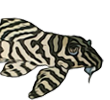Histology of Catfish
-
p_murthi
- Posts: 4
- Joined: 02 Feb 2004, 23:07
- Location 1: Pomona, California
- Interests: histology of catfish (digestive system mainly)
Histology of Catfish
I just started a MS program looking for clues in phylogenetics/systematics among Loricariidae (especitally Lithogenes). I am specifically interested in histological sectioning of digestive tract. Wondering if anybody else is working along similair lines or would care to chat about these topics and help a newcomer to the science of catfish.
specifically seeking technical histological skills, wondering about LITHOGENES (loricariidae vs. astroblepidae)
-
Rusty
- Posts: 682
- Joined: 30 Dec 2002, 14:51
- Location 1: New York, NY
- Interests: Mochokidae, Clariidae, Heteropneustidae, Malapteruridae, Chacidae, Cetopsidae, Bagridae, Amphilidae
- Contact:
Scott Schaefer has recently published two papers on Lithogenes.
Schaefer, S.A. Relationships of Lithogenes villosus Eigenmann, 1909 (Siluriformes: Loricariidae): Evidence from high-resolution computed microtomography. American Museum Novitates, 3401:1-55.
and
Provenzano, F., S.A. Schaefer, J.N. Baskin, and R. Royero-Leon. New, possibly extinct lithogenine loricariid (Siluriformes, Loricariidae) from northern Venezuela. Copeia, 2003(3):562-575.
(which can be downloaded here [PDF])
Lithogenes will be a very difficult genus to work with, if only because of the complete lack of material. Until a few months ago, the entire genus was represented by a single specimen, which is why Dr. Schaefer had to resort to high resolution 3D CT scans to get a look at skeletal structure. A few more specimens were recently caught, but the number in museum collections is still in the single digits.
Rusty
Schaefer, S.A. Relationships of Lithogenes villosus Eigenmann, 1909 (Siluriformes: Loricariidae): Evidence from high-resolution computed microtomography. American Museum Novitates, 3401:1-55.
and
Provenzano, F., S.A. Schaefer, J.N. Baskin, and R. Royero-Leon. New, possibly extinct lithogenine loricariid (Siluriformes, Loricariidae) from northern Venezuela. Copeia, 2003(3):562-575.
(which can be downloaded here [PDF])
Lithogenes will be a very difficult genus to work with, if only because of the complete lack of material. Until a few months ago, the entire genus was represented by a single specimen, which is why Dr. Schaefer had to resort to high resolution 3D CT scans to get a look at skeletal structure. A few more specimens were recently caught, but the number in museum collections is still in the single digits.
Rusty
-
p_murthi
- Posts: 4
- Joined: 02 Feb 2004, 23:07
- Location 1: Pomona, California
- Interests: histology of catfish (digestive system mainly)
Thanks, saw the article before, but keep insight coming
Thanks for your feedback, am well aware of lack of specimens availible for analysis, nevertheless will gain practical experience with other loricariidae and astroblepidae availible prior to moving on AMNH SATS 53.6 SATS 01-11 specimen which is availible.
Do you do histology? Do you know anyone else who might be doing fish histo? Just getting started and always interested in shop talk.
Do you do histology? Do you know anyone else who might be doing fish histo? Just getting started and always interested in shop talk.
specifically seeking technical histological skills, wondering about LITHOGENES (loricariidae vs. astroblepidae)
- Silurus
- Posts: 12419
- Joined: 31 Dec 2002, 11:35
- I've donated: $12.00!
- My articles: 55
- My images: 893
- My catfish: 1
- My cats species list: 90 (i:1, k:0)
- Spotted: 424
- Location 1: Singapore
- Location 2: Moderator Emeritus
-
p_murthi
- Posts: 4
- Joined: 02 Feb 2004, 23:07
- Location 1: Pomona, California
- Interests: histology of catfish (digestive system mainly)
Thanks
you probably don't need museum stuff for the sisorids, but you are right (the alcohol doesn't necessarily provide for the best resolution of histology)
are you using DNA (r16S?) for your phylogenetic comparisons? probably allows for more definitive conclusions, anyway im still novice so won't have to worry about actually wasting limited segments of specimens until I get more practice
are you using DNA (r16S?) for your phylogenetic comparisons? probably allows for more definitive conclusions, anyway im still novice so won't have to worry about actually wasting limited segments of specimens until I get more practice
specifically seeking technical histological skills, wondering about LITHOGENES (loricariidae vs. astroblepidae)





